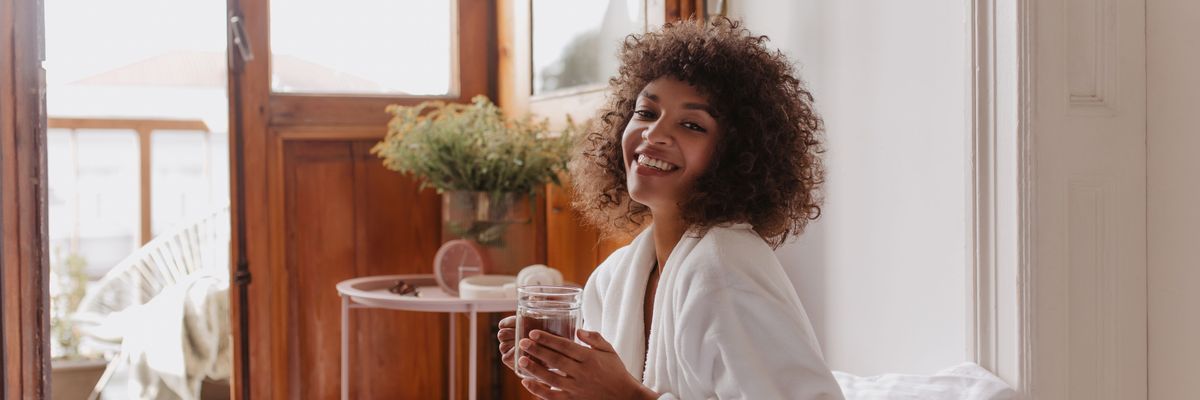The Faith-Guided Money Mantra This 27-Year-Old Forex Investor & Coach Swears By

Money Talks is an xoNecole series where we talk candidly to real women about how they spend money, their relationship with money, and how they spend it.
Lately, there's been a lot of chatter around Forex and cryptocurrency, but do we really know what it is or how to use it? Thankfully, Umanagement Public Relations' lead publicist Milan Mobley is a business coach, Forex trader, and investor willing to dispel any myths about the system for us. Though the D.C. native is well-known for her work as a full-time entertainment and corporate publicist, she has developed a passion for teaching millennials how to build generational wealth and deeper understanding of multiple streams of income. "I entered the Forex market almost three months ago, my girlfriend Che` introduced me to it. She's been in this space for a few years now. She ended up taking a break to focus on her career full-time, but she never lost touch," she told xoNecole.
During the pandemic, Milan's business slowed down and she began to fall into a depression due to the unexpected pivot of her business thanks to COVID-19. From there, her friend began to show her the ropes and through following by example, Milan is now developing a steady cash flow and effortlessly recouping from any financial loss she may have suffered. "Now I am still growing to be a master of the art but it is a skill that I am forever grateful for. It changed my life when life was changing the most."

Courtesy of Milan Mobley
Now with a current ranking of P1000, meaning she's been able to mentor and educate over 31 new investors, Milan is able to pay the education forward by passing along any and all information that was once given to her by her partner Che. "I made this choice based on Che`. Her mentorship and guidance made me the trader I am today, and allowed me to be educated in a space I was unfamiliar with. Becoming an IBO, I've been able to educate others on the Foreign Exchange Market who were in the same space of wanting to build generational wealth, needing an additional stream, and wanting money working for them. I do not have the conversations of becoming an IBO (independent business owner) with my mentees until I see they are being successful in the FX market."
In this installment of "Money Talks", xoNecole spoke with the Atlanta, Georgia resident on being a "Frugal Fran" when it comes to spending habits, her worst money decision, and why she believes most people think Forex trading is a scam. Check it out below!
On myth-busting Forex and why most people believe it’s a scam:
"People believe it is a pyramid scheme because they are uneducated of what the difference is between Forex and the iMarkets Academy. The Academy is the number one educational platform/software for Forex Traders. This platform was designed to assist traders in their learning about the market, learning how to trade, software and strategies to assist in developing signal points for profitable trading and a special chart known as the Harmonic scanner. All of this is to help you earn while you learn. In an illegal pyramid scheme––or scam as we like to call it––there is no way for anyone who is under the head honcho to profit as much as that one person or to exceed them. Forex trading is a skill and trait you obtain and become successful with, on your own with the proper teachings."
On what being a trader and investor has taught her about her business and personal financial habits:
"It taught me how to capitalize financially. When you first start trading, not everyone has thousands to invest. In trading, you commonly use the word 'compounding', meaning you take what you invest and you build your account over time. For example, Che' and I encourage our Mentees who are afraid of the process or have lower capital to invest $50 but only trade with $20 and build your account slowly. With those teachings, our mentees have taken $20 and turned it into $95.00 in a day. We also tell them to focus on growing your account by 10% daily.
"All in all, teaching them has taught me to focus on compounding my personal finances and act always as if I have the lowest capital possible. Using money management on your investment amount will take you further as long as you are patient and not looking to get rich overnight. Rome wasn't built in a day and neither is wealth. In the business aspect, there's a strategy and system known as S&S for everything. Based on the S&S you select/determine, your journey in business or trading can be either very simple and profitable or it can be complicated and a struggle."
"Using money management on your investment amount will take you further as long as you are patient and not looking to get rich overnight. Rome wasn't built in a day and neither is wealth."
On questions she wished people would stop asking her about Forex:
"'How early can you actually start seeing profit coming in for yourself?' And, 'How much have you made?' It's a common question and I get it. However, that is like asking a fitness trainer, 'How soon am I going to see results?' The answer a trainer would give is the same answer I give. Everyone is different, no one person is the same. How early you start seeing profit and how much profit you see is how much effort you put forth to see results."
On how much she makes per year and her savings habits:
"It is very hard for me to say how much I make a year or a month honestly, being an entrepreneur that fluctuates so much––last year after the dreading amount of taxes, I made over $90,000. Normally, I don't share numbers in my finances since I am so private but I am comfortable to share that because that was my most profitable year in business. I try to save at least $2,000 to $3,000, that way it can be split between my business and added to my personal account. I have both my high-yield savings account through Marcus by Goldman Sachs and my Roth IRA is through my long-time bank Navy Federal."
On her definitions of wealth and success:
"Health is wealth and having much abundance in your life through happiness and prosperity brings great success. Wealth to me is being able to live the way I choose to––not working countless hours and working about how much I've made or haven't made or what's to happen next. Living the kind of life that makes you happy and fulfilled. Success is truly being open-minded and opening yourself to a new level of life that challenges you to grow and develop mentally, spiritually, and professionally forever."

Courtesy of Milan Mobley
"Wealth to me is being able to live the way I choose to––not working countless hours and working about how much I've made or haven't made or what's to happen next. Living the kind of life that makes you happy and fulfilled."
On the lowest she’s ever felt when it came to her finances and how she overcame it:
"The end of last year and the start of this year was the lowest I've felt – I was tapping in and having to drain my savings and not being able to replenish it for a while due to the decline in business from COVID-19. As stated previously, I was depressed from being in this unfamiliar state. I wasn't sure which way to turn for a while. Then I started focusing more on S&S and developing residual streams and being open to learning new skills. I could have counted myself out but a big part of my system was letting go and letting God. I started doing what I could and allowing Him to do the rest."
On her biggest splurge to date:
"I have never been a 'splurger'. My friends will tell you I am very financially responsible. I don't purchase much designer, I don't shop much, I don't spend money unnecessarily. I don't spend money that I can't spend two times over. HOWEVER, I did 'treat myself' last September for my birthday and that's because I didn't go out of the country or on a trip like I normally do. So I showered myself with the Louis Vuitton boots, red bottoms, one of the top suites at the W and a private chef all weekend. I can say that was a properly planned splurge I had prepared for that moment. It's OK to 'splurge' as long as you've properly planned for it."
On whether she’s a spender or a saver:
"I am Frugal Fran––I am very much a saver. It wasn't training, I just looked at my environment and listened to mistakes others made and used that as my guide to not repeat the same steps."
On her savings goals and what retirement looks like to her:
"I make contributions to my Roth, to my 401k, business and personal savings, Digit (the savings app I use it takes money from your account daily without a notification), I want each to represent and hold six- to seven-figures in them. Retirement to me looks like never having to work again, fully enjoying life, my family, and all that it has to offer, without the worry of making money. Also, retiring in my early 40's late 30's, not the time that has been placed on us. If I can retire before my desired time frame, that is even better!"
On the importance of investing:
"It is very important to invest in my opinion––you don't become wealthy by having zero investments. The goal is to be wealthy and have a strong net worth, not to be rich. I invest in, of course, my trading, but I also have stock investments, life insurance investments, and plans to invest in property and other assets in the upcoming years."

Courtesy of Milan Mobley
"I make contributions to my Roth, to my 401k, business and personal savings, Digit, I want each to represent and hold six- to seven-figures in them. You don't become wealthy by having zero investments. The goal is to be wealthy and have a strong net worth, not to be rich."
On her budgeting must-haves:
"At one point I would have said my nails. After the shutdown from the pandemic and not having that luxury, I realized how I didn't need it in my budget. My budget must-haves now are groceries, daily incidentals, emergency fund, household maintenance, bills, work wardrobe, subscriptions for business, [and] gas."
On the intention behind creating her multiple streams of income:
"In my business, I have both live and digital courses, pop-up consultations for various aspects in business, whether it be social media, marketing, etc., e-books, digital products, business coaching, and more. When developing those streams, I wanted relief for myself––where I didn't always have to be so hands-on. I had those residual pieces and money working for me all days of the week, even when I'm sleeping. My intention behind having multiple ways to make money was to have financial freedom, build generational wealth, and to grow my companies."
On her money mantra:
"God will bless me abundantly financially if He sees I can manage a little. He will not give me a lot If I can't handle the little."
On the craziest thing she’s ever done for money:
"I haven't had to do anything crazy––I just had to learn to be still and fully rely on faith. God gave me everything I needed; I just had to use what was in front of me to pivot."
On the worst money-related decision she’s ever made:
"Investing in t-shirts was the worst money and business decision I've ever made. The sayings on the shirts were great––but it wasn't the right product, right audience, or the right timing."
On her budget breakdown:
How much do you spend on rent?
"For an entire year on rent––$20,280.00."
Eating out/ordering in?
"Monthly, around $500 eating out/ordering in and $530 on groceries. I cook for the majority of the week. But Thursday-Saturday is up-for-grabs for eating out! [There's] two of us, so it is very hard to eat out/order-in and stay with a $20 minimum."
Gas/car note?
"I don't have a car note any longer and I don't drive much because I don't go anywhere since COVID is still a thing. I spend about $26 monthly on gas. I pay $110 monthly in car insurance."
Personal expenses?
"$160 monthly on personal expenses [including] nails, lashes, personal items."
For more of Milan, follow her on Instagram!
Featured images by @heytobs and @Toontyvisuals.
This Is How To Keep 'Holiday Season Stress' From Infecting Your Relationship
Hmph. Maybe it’s just me, but it seems like there is something really weird happening in the fall season air (because winter doesn’t officially begin until December 21) that cuddle season is in full swing while break-up season is as well. In fact, did you know that break-ups are so popular during the holiday season that December 11 is deemed Break-Up Day?
The reasons why relationships shift around this time vary; however, I did both roll my eyes and chuckle when I read that a very popular one is because it’s an easy way to get out of getting one’s significant other a Christmas present. SMDH.
Anyway, I personally think that the less shallow folks out here may contemplate calling things “quits” or they at least distance themselves a bit from their partner (and what I’m referring to is serious relationships) due to all of the stress and strain that oftentimes comes with the holidays whether it be financial, familial, due to their tight schedules or something else.
Listen, I would hate for you and your man to miss the fun and happiness of experiencing this time of year, all because you are so overwhelmed or irritated that you can’t really enjoy it. That’s why I have a few practical tips for how to avoid allowing the typical holiday season stress from INFECTING your relationship.
Manage Your Expectations
 Giphy
GiphyUnmanaged expectations. If there is a main reason why the holiday season tends to be so stress-filled for so many people, I’d bet good money that this is the cause. And when you’re in a long-term relationship, expectations can manifest themselves in all sorts of cryptic and/or unexpected ways. You might have relatives who assume that you are going to be with them for Thanksgiving or Christmas when you have other plans in mind. You might be thinking that you are going to spend one amount for presents while your man is thinking something totally different. When it comes to scheduling, your signals may be crossed.
And you know what? To all of these scenarios, this is where clear and consistent communication come in. Don’t assume anything. Don’t dictate anything either. From now until New Year’s, mutually decide to check in once a week, just to make sure that you are both on the same page as it relates to the holidays and what you both are thinking will come along with it. The less blindsided you both feel, the less stressed out you will be. Trust me on this.
Set (and Keep) a Budget
 Giphy
GiphyOkay, so I read that last year, 36 percent of Americans incurred some type of holiday-related debt. Hmph. Last year, there was still some sense of normalcy in this country, chile, so I can only imagine what finances are gonna look like over the next several weeks. That said, since I don’t know a lot of people who don’t find being broke stressful, make sure that you and your bae set a budget and then stick to it this year — no ifs, ands or buts.
Because really, y’all — it doesn’t make sense to deplete savings and/or max out credit cards for a few days of giggles only to be damn near losing your mind because you don’t know how to make ends meet come Dr. Martin Luther King, Jr. Day.
And by the way, this tip doesn’t just speak to things like food and gifts; I also mean travel. If it doesn’t make a ton of sense (or cents) to be all over the place this year — DON’T BE.
Keep Matthew 5:37 at the Forefront
 Giphy
GiphyIf off the top of your head, you don’t know what Matthew 5:37 says, no worries, here ya go: “But let your ‘Yes’ be ‘Yes,’ and your ‘No,’ ‘No.’ For whatever is more than these is from the evil one.” That verse right there? Oh, it’s a boundaries lifesaver! I say that because do you see “maybe” or “I’ll think about it” in there? Nope. LOL. It says that you should tell people “yes” or “no” and leave it at that — and that complements Anne Lamott’s quote, “’No’ is a complete sentence” impeccably well. Yeah, you’ve got to remember that anything beyond a yes or no to a request is privileged information; you don’t owe anyone details or an explanation.
Besides, if you are really honest with yourself, when someone asks you something and you give a “Umm, let me think about it” kind of reply, more times than not, you already know what your answer is going to be — so why not let you both off of the hook? Give your response. Commit to that. And let everyone (including yourself) get on with their lives and schedules.
I promise you that when it comes to those holiday parties, you are pissing more folks off by not RSVP’ing or doing so and not showing up than just saying, “Thank you but not this year” off the rip.
Remember That Your Personal Space Is Privilege Not a Right
 Giphy
GiphyA friend of mine recently bought a new house and invited me over to come see it. He’s a single man with no children, so as I was taking in all of the space that he had, especially as I walked through his finished basement, I joked about relatives coming to live with him. “Hell no” and “absolutely not” were pretty much his immediate responses as he went on to say that some folks even had the nerve to be offended when he told them that he had no intentions on taking DNA in.
Ain’t it wild how people think that your stuff is their right? And yes, that brings me to my next point. Your home is your sanctuary space. If you want to host folks this year — cool. If not, ALSO COOL. Please don’t let folks (family included) guilt you into how they want you to act or even into what they would do if the shoe was on the other foot. You are not them — and as one of my favorite quotes states, “If two people were exactly alike, one of them would be unnecessary.” (A man by the name Larry Dixon said that.)
Hell, my friends? They know that I am good for sending them random things that they need or even want all throughout the year. Coming over to hang out at my pace, though. Uh-uh. Chalk it up to being a card-carrying member of the ambivert club yet I like keeping my living space personal — and I sleep like a baby, each and every night, for feeling that way.
Always remember that your space, your time, your resources, your energy and shoot, yourself period (including your relationship), are all things that are your own. You get to choose how, when and why you want to share them. The holiday season is certainly no exception.
Cultivate Some “You Two Only” Traditions
 Giphy
GiphyIt’s not uncommon for some couples to hit me up after the holiday season to “detox.” Sometimes it’s due to the financial drama (and sometimes trauma) that they experienced. Sometimes it’s because they allowed their relatives (especially in-laws) to get more into their personal business than they should’ve. More than anything, though, it tends to be because they didn’t get enough quality time together and so ended up feeling “disconnected.”
Please don’t let that happen. Listen, I’m not even a holidays kind of woman and yet, I will absolutely sit myself down with some hot chocolate and chocolate chip cookies to enjoy a Hallmark holiday film or two. Aside from the fact that most of them are lighthearted and sweet, I also like that they usually focus on couples loving on each other amidst all of the holiday beauty and ambiance — which is something that all couples should set aside some time to do.
Maybe it’s a vacation. Maybe it’s a staycation. Or maybe it’s my personal favorite, A SEXCATION. Whether it’s for a few days, the weekend or even overnight — don’t you let the holidays go by without setting aside time for you and your man to celebrate one another. Don’t you dare (check out “Are You Ready To Have Some Very Merry 'Christmas Sex'?”).
GET. SOME. REST.
 Giphy
GiphyI once read that 8 out of 10 people get stressed out over the holidays and 3 out of 10 lose sleep during to it — and when you’re stress-filled and sleep-deprived, that can absolutely lead to hypersensitivity, making mountains out of molehills and even not being in the mood for sex.
Your relationship can’t afford to go through any of this, so definitely make sure to prioritize rest. I don’t care how unrealistic it might seem during this time, sleep should never be seen as a luxury; it will always and forever be a great necessity.
That said, try to get no less than six hours of shut-eye in (check out “6 Fascinating Ways Sex And Sleep Definitely Go Hand In Hand”) and even ask your bae to take a nap with you sometimes (check out “Wanna Have Some Next-Level Sex? Take A Nap, Sis.”). Not only will sleep help to restore your mind, body and spirit but, when it’s with your partner, it’s an act of intimacy that can make you both feel super connected, even in the midst of what might feel like chaos.
___
Holiday season stress is real. Still, never give it the permission or power to throw your relationship off. Put you and your man first and let the holidays be what they are gonna be, chile.
Let’s make things inbox official! Sign up for the xoNecole newsletter for love, wellness, career, and exclusive content delivered straight to your inbox.
Featured image by Shutterstock
Whew. Did you know that somewhere around 122 million Americans travel during the holiday season? Listen, I went to see my godbabies this past September and got caught up in a crazy ass traffic jam at BNA (the Nashville airport) that damn near has me considering air travel ever again — especially during this time of the year.
Besides, it’s not like it’s a written rule that you have to travel over the holidays. In fact, if you want to play it chill this year, why not enjoy a staycation instead? Although it might seem like it’s a “poor man’s compromise,” as you’re about to see, it actually…isn’t.
1. Go All Out with the Christmas Décor
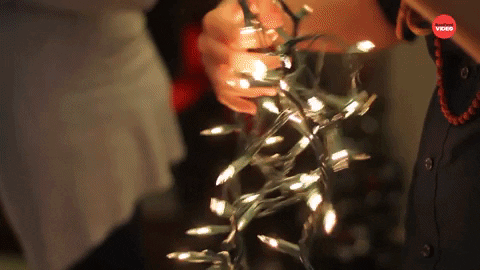 Giphy
GiphyThere is someone I know who is so obsessed with Christmas, she’s damn near annoying-borderline-terrifying. I’m. Not. Kidding. Yet hey, if you’re going to do a holiday-themed staycation (emphasis on “holiday-themed”), that’s kind of how you’ve got to be. Some décor ideas include:
- A fresh Christmas tree (is the most ideal) that is ultimately decorated
- Wreaths on outside and inside doors
- Garland (with twinkle lights) in predictable and unpredictable places
- Poinsettias
- Mistletoes
- Snow globes
- A stocking (with some of your favorite things in it)
- Fake snow
- Stars
- Angels
- Candy canes
- A BLACK Santa (LOL)
I mean, since you are going to be spending a lot of time at home, it can feel like a mini-winter wonderland if you are intentional about doing more decorating to your living space than you ever have before!
2. Buy a Couple of Christmas-Themed PJs
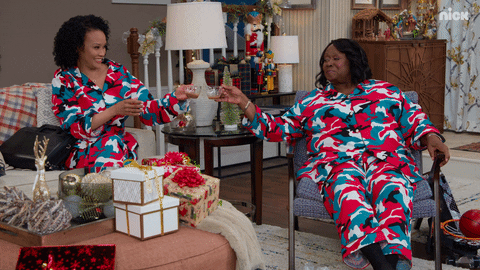 Giphy
GiphyWhile I was doing some research on a totally different topic, I happened upon an article that talked about the psychology behind why we should be intentional about what we wear to bed. When you stop to think about the fact that (hopefully) you are sleeping somewhere between 6-8 hours every night, it would make sense that things like the color and fabric of your sleepwear would have a real impact on you — even subconsciously.
Well, when it comes to Christmas décor, specifically, not only does it take you back to nostalgic memories, it can also boost your moods. So, aside from being on-10 with your Christmas décor, also invest in some Christmas-themed PJs. Since you’re going to be doing a lot of lounging around (RIGHT?), do it in something that makes you think about all of your favorite things about this time of year.
3. Cop Some Christmas-Scented Candles
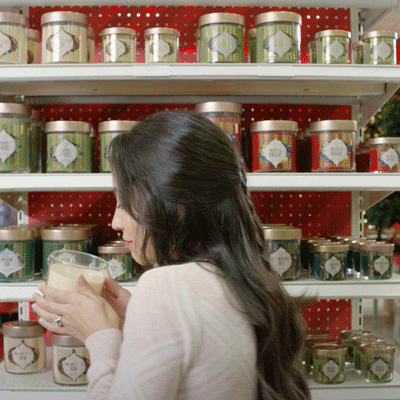 Giphy
GiphyThere really is no telling how many articles that I’ve written where I am singing the praises of scented soy candles. Candles are soothing, comforting and a very easy way to reduce stress. Also, since it gets darker quicker and for a longer period of time around this time of the year, candles provide a relaxing vibe to your home. Since it is Christmastime, go with scents that are reminiscent of the season:
- Cinnamon
- Vanilla
- Cranberry
- Apple
- Pine
- Frankincense and Myrrh
- Peppermint
- Cashmere
- Ginger(bread)
- Orange
- Sugar Cookies
- Sandalwood
- Cloves
- Cedarwood
- (Hot) Chocolate
Personally, one of my favorite candle companies is Goose Creek. Their signature collections will have your entire house smelling like a high-end bakery. No exaggeration.
4. Play Some Winter-Themed ASMR Sounds
 Giphy
GiphyI’m from Nebraska and my mother was a New Yorker. So, if there is one thing that I like, it’s seasons and that includes snow during wintertime. Unfortunately, Nashville is cray-cray when it comes to that. If, where you live, the weather is all over the place too (which is why I think it’s insane that some people still give pushback to global warming) and you would like for it to at least seem like you are in your own winter wonderland — invest in some fake snow to strategically place around your home.
Oh, and don’t forget to turn on some winter-themed ASMR sounds too. YouTube has videos that run for hours on end that feature blizzards and howling winds that really can make you feel like you are in the midst of an ice storm.
5. Host a Holiday Movie Marathon
 Giphy
GiphyOne thing to remember about a staycation is it doesn’t mean that you have to be alone or that the only people who can participate are the ones who live with you. Since a staycation is simply about staying close to home instead of traveling afar — absolutely consider having some of your favorite people over for a holiday-themed movie marathon. Shoot, Black America Web even did you a solid by publishing “25 Best Black Christmas Movies Of All Time;” plus, Tubi has a Black holiday hits section of indie films too.
Oh, and make sure to get creative with the Christmas-themed snacks. Some ideas? Some Kentucky-fried turkey tenders with cranberry hot sauce (recipe here), some Holiday Hot Spinach Dip (recipe here), some Grinch Kabobs (recipe here), some roasted pecans (recipe here) and some Pomegranate Guacamole (recipe here).
6. Spend a Night (or Two) at a Hotel or Vacation House
 Giphy
GiphyJust like you don’t have to be alone during a staycation, you also don’t have to be cooped up in your house the entire time. Get a change of scenery in your own city by spending the night in a hotel that you’ve always wanted to try out or renting a vacation house for you and some of your folks to hang out in during the time between Christmas and New Year’s Day. I have a “love little sister” who does this randomly when she needs a break from her work as a therapist. She says that it’s damn near like taking a trip (and she has PLENTY of passport stamps; trust me).
7. Have Brunch or Dinner at a Christmas-Themed Restaurant
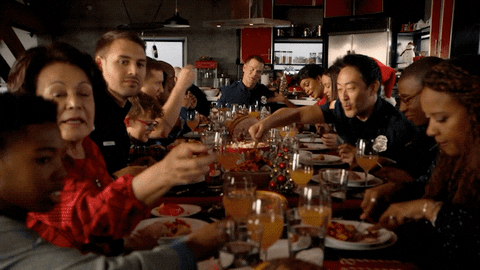 Giphy
GiphyIf nothing puts a bigger smile on your face than the thought of DoorDashing meals and barely even touching your stove during your staycation — hey, I am right there with you. Do consider going out to brunch or dinner during your chill time, though. It’s another way to bond with people and create some current holiday memories. And if you’ve got a bae and you opt for dinner, it can be a wonderful type of Christmas-themed date.
8. Go to a Holiday-Themed Concert
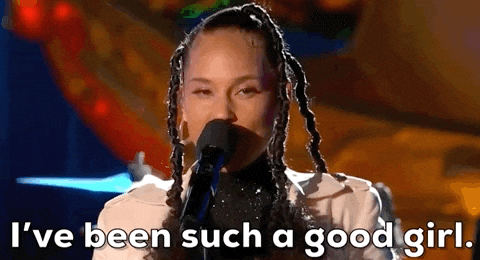 Giphy
GiphyBeing that I got my start as an entertainment writer, hear me when I say that I’m not someone who just has to go to a live concert every chance that I get. Oh, but baby, when I saw that El DeBarge was doing a City Winery tour and he was going to be here right before Christmas — I booked myself a ticket quick, fast and in a super-duper hurry! Shoot, I didn’t even want to go with someone because I plan to give him and that falsetto voice of his my complete and undivided attention. LOL.
I don’t know what it is about the holiday season that makes live music that much more enjoyable — but if there is a concert that features one of your favorite artists happening right through here, consider that to be a cool way to “tour your city” while cultivating a really awesome memory at the same time.
9. Also, Go Ice Skating
 Giphy
GiphyOne of my fondest memories of time with my father is going ice skating. We actually would do it in the summer (because that is when I would visit him) and, every year, he would get me a new ice skating outfit. Even now, when I watch someone ice skate (even in movies; like in the classic movie Garden State), I will have warm fuzzies.
Anyway, if you’ve never been before, go. If it’s been forever since you have, also go. There is something that is very sweet and so signature Christmas about it. Plus, it’s a top-tier form of exercise.
10. Take a Christmas Lights Tour
 Giphy
GiphyAnother one of my favorite Christmas memories is driving through neighborhoods and looking at the Christmas lights. And just like a Christmas concert can be a form of hometown touring, so can doing this if you decide to choose a couple of areas where you’ve never really been or rarely frequent.
Now are you excited about the thought of experiencing a holiday-themed staycation?
I thought you would be. ENJOY!
Featured image by Shutterstock









